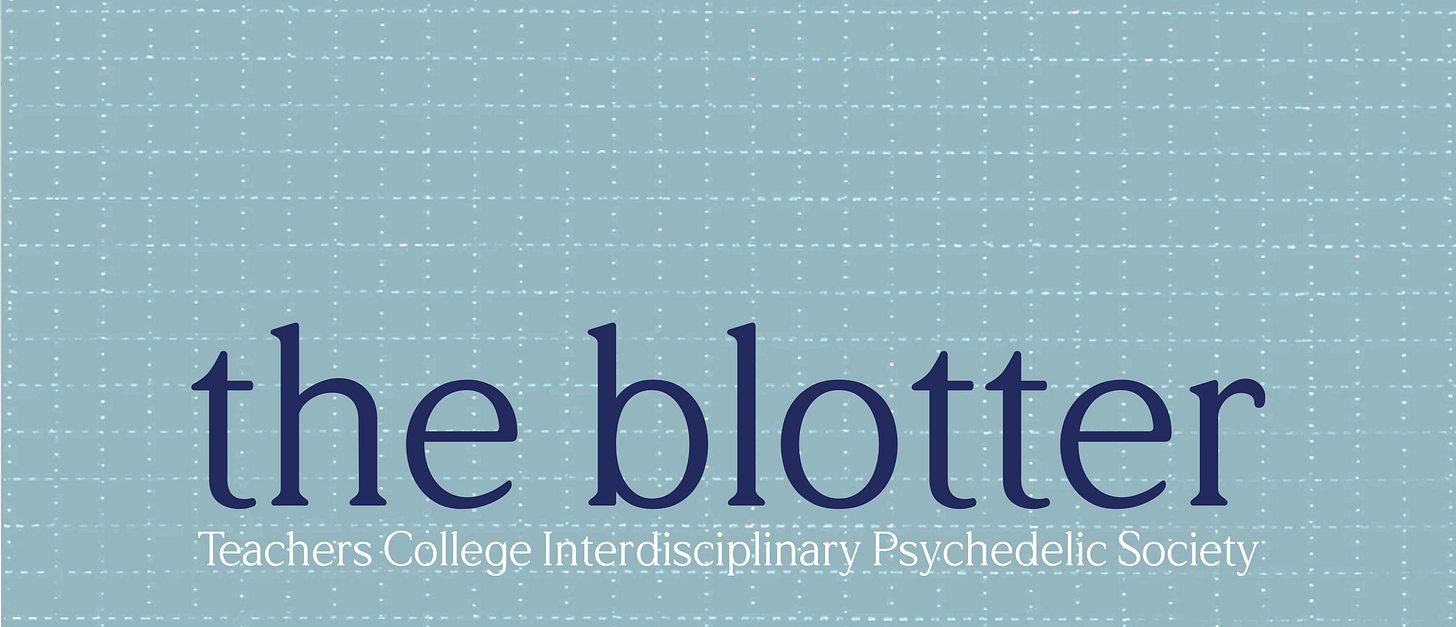Welcome Back to The Blotter!
Welcome back to The Blotter, a weekly publication with articles and insights from graduate students at Teachers College, Columbia University. If you’re joining us for the first time, The Blotter is part of a student-run group, the Teachers College Interdisciplinary Psychedelic Society (TCIPS), which aims to bring psychedelic science and research back into the fold of academia. Here at the Blotter, we publish short articles every week discussing psychedelic science, new research, our own ideas and connections, and other topics within the vast psychedelic landscape.
As Teachers College kicks off its fall semester, TCIPS is back and we’re so excited to be working together again. This summer brought about some exciting changes to TCIPS, including a new leadership team, new volunteers joining the TC program, and new opportunities to talk about psychedelic research. A lot has happened since our last publication, so here at The Blotter we wanted to give you some short updates on TCIPS and the psychedelic landscape over the last few months.
Psychedelic Research
While The Blotter took a brief hiatus over the summer, Psychedelic research did not slow down. Before we dive into the findings, I want to give much credit to Blossom Analysis (https://blossomanalysis.com/) for compiling and breaking down psychedelic research in their weekly email, which comes out every Tuesday. If you’re interested in a more thorough reading of any concepts described in this article, I would highly encourage you to check out the work of Blossom Analysis.
Much of the attention of psychedelic research was on Psychedelic-Assisted Psychotherapy (PAP). Studies investigated many aspects of PAP that will inform future standardized models of this therapeutic modality. One Paper explored the role of physical touch during group psilocybin-assisted psychotherapy, which encouraged ethical practices surrounding physical touch such as explicit consent and body-based therapeutic techniques. Another study explored the role of music in PAP, and found that personalized music protocols, similar to those found in indigenous practices, coil enhance therapeutic outcomes.
In addition to the research on PAP guidelines, the investigation into cognitive and mental impacts of psychedelic use continue to rage on. One observational study suggested that long-term use of ayahuasca may be linked with long term cognitive benefits in verbal and visuospatial working memory. In a one-year follow up study of people living with generalized anxiety disorder, results suggest that LSD-assisted psychotherapy can help with sustained reductions in anxiety.
While I only mention four studies that caught my eye here, there were hundreds of articles published from psychedelic studies taking place all over the world. While there is much work left to be done, it is encouraging to feel the research inching closer to unlocking the therapeutic potential of various psychedelic substances.
The FDA Decision
The biggest news in the psychedelic landscape from this summer came in early August, when the U.S. Food and Drug Administration (FDA) denied a New Drug Application (NDA) from Lykos Therapeutics. This NDA sought approval for an MDMA-based drug in hopes to use this psychedelic substance to treat Post-Traumatic Stress Disorder. The FDA decided to deny Lykos Therapeutics' application based on the data available at the time. While this decision was disappointing to many psychedelic researchers, the foundation of the FDA’s decision was solid. The FDA raised valid criticisms with the clinical trials produced by Lykos Therapeutics, including the concern that participants were able to tell whether they had received the MDMA drug or placebo. With these concerns in mind, there is also a revitalized sense of optimism in the psychedelic research sphere, as future studies of psychedelic drugs can aim to address the FDA’s worries in order to attain future approval from this governing body.
One thing that must be addressed in future psychedelic research are the ethical concerns that arose just one after the FDA decision. Scholarly journal Psychopharmacology retracted three studies about MDMA-assisted psychotherapy, including one retraction after a female participant in the study disclosed a sexual relationship with one of the therapists. You can read the full story for yourself here, but for now, I’ll close this conversation by saying that unethical behavior in research cannot be tolerated in any field of science. While widespread concerns about the potential benefits and pitfalls of psychedelic use continue to be a barrier to PAP access for those living with mental health disorders, psychedelic researchers have to ensure that we are acting with the utmost care in mind toward participants.
TCIPS
On a more positive note, we’re also excited to share what TCIPS is working on this semester to contribute to the vast, interdisciplinary psychedelic landscape. In addition to this publication of The Blotter, TCIPS is continuing to host our Journal Clubs, where graduate students at TC talk about cutting-edge psychedelic research papers. We are also excited to continue to spread scientific information on various psychedelic topics with other psychonauts on our social media pages. You can find all of our pages through Our Linktree, and give us a follow to stay up to date with TCIPS.
By Ian Carroll



Super excited to be back! Thanks for sharing these updates, Ian